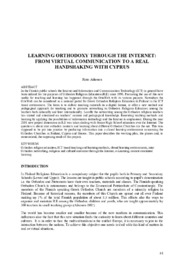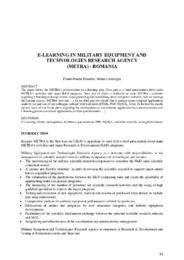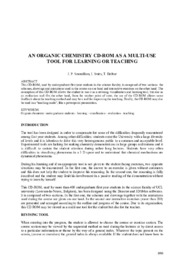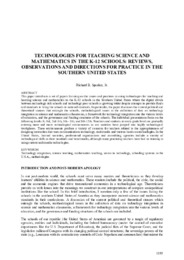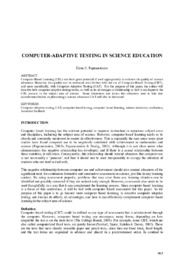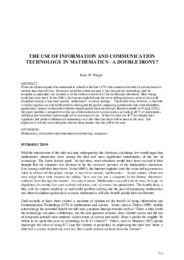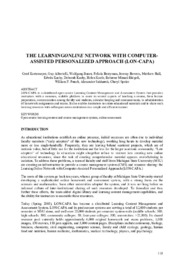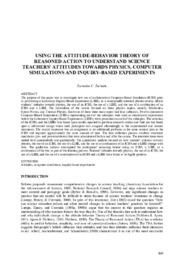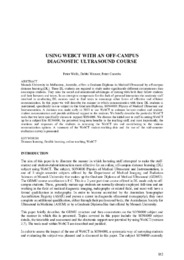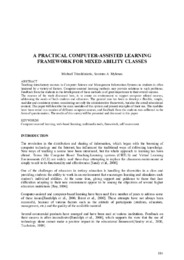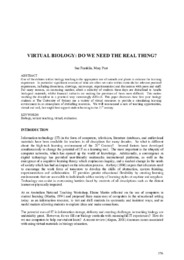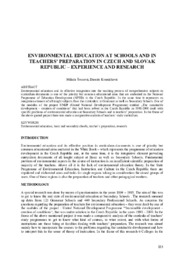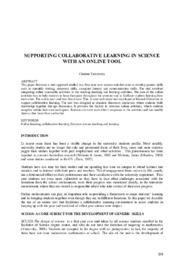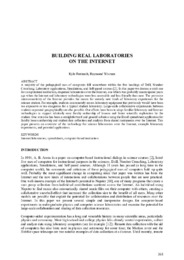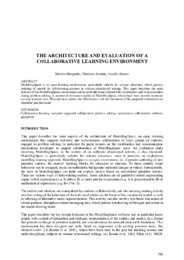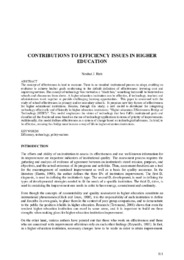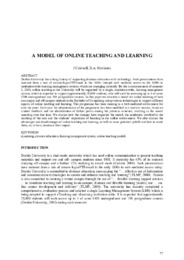Browsing CBLIS Conference Proceedings 2003 Volume I: New Technologies and their applications in education by Issue Date
Now showing items 41-60 of 120
-
Learning orthodoxy through the internet: from virtual communication to a real handshaking with cyprus
(Department of Educational Sciences, University of Cyprus, 2003)In the Finnish public schools the Internet and Information and Communication Technology (ICT) in general have been utilized for the purposes of Orthodox Religious Education (R.E) since 1998. Promoting the use of this new ... -
E-learning in military equipment and technologies research agency (metra) - Romania
(Department of Educational Sciences, University of Cyprus, 2003)The paper shows the METRA's achievements in e-learning area. First part is a brief presentation about main METRA’s activities and major R&D programs. Next part of paper is dedicated to main METRA’s activities regarding ... -
An organic chemistry cd-rom as a multi-use tool for learning or teaching
(Department of Educational Sciences, University of Cyprus, 2003)This CD-ROM, used by undergraduate first year students in the science faculty, is composed of two sections: the schemes, drawings and animations used in the course on one hand and interactive exercises on the other hand. ... -
Technologies for teaching science and Mathematics in the k-12 schools: reviews, observations and directions for practice in the southern united states
(Department of Educational Sciences, University of Cyprus, 2003)This paper introduces a set of papers focusing on the issues and practices in using technologies for teaching and learning science and mathematics in the K-12 schools in the Southern United States where the digital divide ... -
Productive face-to-face interview
(Department of Educational Sciences, University of Cyprus, 2003)Computer Based Learning (CBL) can have great potential if used appropriately to enhance the quality of science education. However, this quality can be enhanced even further with the use of Computer Based Testing (CBT), and ... -
The use of information and communication technology in mathematics - a double irony?
(Department of Educational Sciences, University of Cyprus, 2003)When the microcomputer was introduced to schools in the late 1970’s the connection between it and mathematics seemed more than obvious. Educators would have been excused if they thought that technology (and the computer ... -
The learning online network with computer-assisted Personalized approach (lon-capa)
(Department of Educational Sciences, University of Cyprus, 2003)LON-CAPA is a distributed open-source Learning Content Management and Assessment System that provides instructors with a common, scalable platform to assist in several aspects of teaching a course, from lecture preparation, ... -
Webcoct – a tool for producing web-based courses
(Department of Educational Sciences, University of Cyprus, 2003)The aim of the paper is to describe the project WeBCoCT (Web Based Courses Creating Tools) intended to become a learning environment to help academic teachers to introduce web-based courses. WeBCoCT has as its main goal ... -
Using the attitude-behavior theory of Reasoned action to understand science teachers' attitudes towards physics, computer simulations and inquiry-based experiments
(Department of Educational Sciences, University of Cyprus, 2003)The purpose of this paper was to investigate how use of an Interactive Computer-Based Simulation (ICBS) prior to performing a Laboratory Inquiry-Based Experiment (LIBE), in a conceptually oriented physics course, affects ... -
Using webct with an off-campus diagnostic ultrasound course
(Department of Educational Sciences, University of Cyprus, 2003)Monash University in Melbourne, Australia, offers a Graduate Diploma in Medical Ultrasound by off-campus distance learning (DL). These DL students are required to study under significantly different circumstances than ... -
A practical computer-assisted learning framework for mixed ability classes
(Department of Educational Sciences, University of Cyprus, 2003)Teaching introductory courses in Computer Science and Management Information Systems to students is often hindered by a variety of factors. Computer-assisted learning methods may provide solutions to such problems. Feedback ... -
Telecommunications technologies and Curriculum development: the case of a virtual High school project
(Department of Educational Sciences, University of Cyprus, 2003)In this paper we present the lessons we learned from developing online classes for a virtual high school (LUDAVHS) project and discuss the implications for teaching science using telecommunication technologies. Emphasis ... -
Virtual biology: do we need the real thing?
(Department of Educational Sciences, University of Cyprus, 2003)One of the debates within biology teaching is the appropriate use of animals and plants to enhance the learning experience. In particular significant amounts of time are often set aside within curricula for relevant practical ... -
Environmental education at schools and in Teachers’ preparation in czech and slovak Republic – experience and research
(Department of Educational Sciences, University of Cyprus, 2003)Environmental education and its effective integration into the teaching process of comprehensive subjects in curriculum documents is one of the priority but common educational aims that are embodied in the National Programme ... -
Supporting collaborative learning in science with an online tool
(Department of Educational Sciences, University of Cyprus, 2003)This paper discusses a new approach trialled in a first year core science unit that aims to develop generic skills such as scientific writing, numeracy skills, computer literacy and communication skills. The trial involved ... -
Building real laboratories on the internet
(Department of Educational Sciences, University of Cyprus, 2003)A majority of the pedagogical uses of computers fall somewhere within the five headings of Drill, Number Crunching, Laboratory applications, Simulations, and Self-paced courses [2]. In this paper we discuss a sixth use for ... -
The architecture and evaluation of a Collaborative learning environment
(Department of Educational Sciences, University of Cyprus, 2003)ModellingSpace is an open learning environment, particularly suitable for science education, which permits building of models by collaborating partners in various educational settings. This paper describes the main features ... -
Labassistant: a web-based general-purpose software for the delivery and administration of computer based laboratory sessions
(Department of Educational Sciences, University of Cyprus, 2003)The design of a web-based general-purpose software system, named LabAssistant, that supports computer-based laboratory sessions is presented. The aim of LabAssistant is to provide support to the preparation, conduct, ... -
Contributions to efficiency issues in higher Education
(Department of Educational Sciences, University of Cyprus, 2003)The concept of effectiveness is hard to measure. There is no standard institutional process to adopt, enabling an evaluator to achieve his/her goals conforming to the default definition of effectiveness: lowering cost and ... -
A model of online teaching and learning
(Department of Educational Sciences, University of Cyprus, 2003)Deakin University has a long history of supporting distance education with technology. Such presentations have matured from a mix of remote-login/FTP/email in the 1980s through web mediated access in the 1990s to ...
